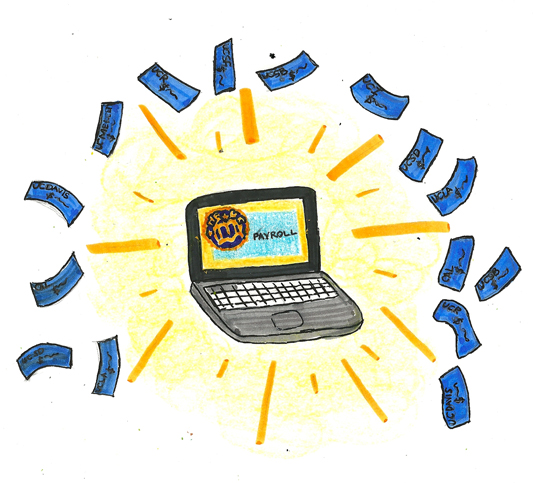Unknown to many students here, UCLA has undertaken a journey of technological renovation to unite all 10 universities and five medical centers in the University of California system.
A plan began to form two and a half years ago by the UC Office of the President. On Tuesday, an email was sent out notifying workers of the change, which would unify payroll standards across the UC and save the system $30 million or more annually.
This new payroll strategy is part of UCPath ““ an acronym for UC payroll, academic personnel, time recording and human resources ““ aimed to streamline and modernize the administration in the areas detailed by the acronym. UCPath itself is projected to save the UC $100 million annually.
UCPath is an example of excellent detective work by UC employees to uncover an area of wasted time and money. It is a renovation past due, but the fact that the UC has acknowledged this problem and has undergone such a large-scale effort to repair it is admirable. The attitude that no system at the UC level is too large to overhaul paves the way for more efficiency in the UC’s future.
The initiative was born when a study in 2009 looked at the UC Personnel Payroll System and found it difficult to use, filled with manual processing and paper data. There were 11 different variations of PPS at the time, and UCPath strives to right that.
Analyzing the results of the 2009 study eventually led to a realization that the human resources system was also inadequate, UCPath Project Director Anthony Lo said. Under the new plan, both human resources and payroll departments will be consolidated into a single office at a yet-to-be-determined location.
UCPath is part of a larger system overhaul titled Working Smarter, which aims to redirect $500 million, within five years, from administrative costs back into the university’s core ““ education and research.
UCLA, along with UC San Diego, UC Santa Cruz, UC Merced and UCOP, compose the first “wave” of the implementation process. This wave serves as a sort of guinea pig period, so that subsequent universities will run more smoothly as they introduce UCPath to their campuses.
It is easier to track hours worked by employees who are paid on an hourly basis rather than on a salary if the checks are biweekly, because it is always a 10-day period, not a fluctuating 28- to 30-day period, said Allison Baird-James, UCLA’s associate vice chancellor and controller.
The UCPath initiative, though still a mere seed of change in the still clunky system of UC administration, is a breath of fresh air for those fed up with the old-fashioned way of doing business. It spans the entire UC system, streamlining a model now fraught with paper and redundancy.
Lo said UCPath does three important things: It improves technology, simplifies the handling processes and makes the system more efficient.
The UC should not be wasting its time on ineffective and outdated processes. While these standards may have been acceptable in 1980, they are inexcusable in the Information Age, and the UC should reflect that in its inner workings, rather than stumbling over issues of communication.
While students may not feel affected by this incoming change, they should take note of the example this project sets. It encourages creative, forward-thinking solutions to problems that may not be immediately apparent.
The Working Smarter initiative, along with UCPath, signals an era of modernization for the UC, though this does not mean the work is done. In terms of future projects, Baird-James mentioned that the financial system itself may need to be replaced.
“Future activities,” Lo said, “will be based on how successful we are and learning from this project.”
We are a research university, and research involves experimentation. UCPath is an example of experimentation on a large scale, aiming to overcome archaic hindrances to the entire UC system.
As students at this university, we should remember that not all experimentation or research is done in a laboratory, and not all discoveries are made under a microscope.
UCPath is a pioneering effort, set against a background of budget shortfall and depressed American spirits. This initiative serves as a beacon of a brighter future of sleek modernization for the UC.
Email Kass at gkass@media.ucla.edu. Send general comments to opinion@media.ucla.edu or tweet us @DBOpinion.
